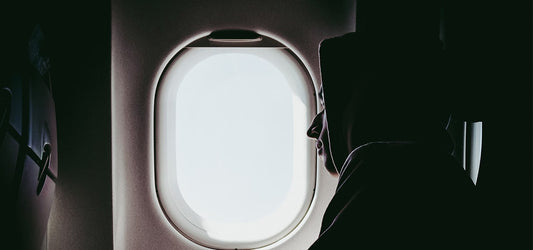How to beat jet lag

Jet lag is a sleep disorder that occurs when the body’s internal clock, the so-called circadian rhythm, no longer corresponds to the local time. 1 Jet lag occurs as a result of air travel over large distances and several time zones. 2 Although it is only temporary, but can affect the ability to fall asleep and wake up and cause feels tired, moody and unable to concentrate. 3 Other symptoms include dizziness, anxiety, changes in appetite and stomach discomfort. 4
Jet lag is common and cannot be prevented. 5 However, there are a few things you can do to mitigate the effects. The most important thing is to adjust your internal clock so that synchronize with the time around you as quickly as possible. 6 studies point to the following possibilities with which you can do this.
- Light exposure : Light has a strong influence on our circadian rhythm. 7 Therefore, a timed Light exposure or light avoidance can help you adapt more quickly. 8 Roughly speaking, Light exposure in the morning sets your internal clock to an earlier time, while light exposure in the evening sets your internal Clock to a later time. 9 A simple recommendation is to be at the new location after the trip to the east in the morning and after the trip to Towards the west to seek light exposure in the evening. 10
- Melatonin : Field trials have shown that the right dosage of melatonin at the right time can may help reduce the symptoms of jet lag and improve sleep quality. 11 The results suggest that The ideal dosage is between 0.5 and 5 mg - it is best to ask your family doctor, because there are both Prescription and non-prescription melatonin preparations and dietary supplements that can increase melatonin levels.
- Sleeping pills : Sleeping pills and clinically proven supplements can also help you fall asleep faster and wake up easier, 12 although sleeping pills are addictive and should only be taken in case of severe symptoms. 13 B・SYNC ON is a dietary supplement with sustained release that helps you wake up naturally in the morning without feeling tired or groggy. It has no side effects, and laboratory studies suggest that it can help you to better control the internal clock.
- Plan your sleep strategically : Adjusting your sleep pattern a few days before your trip to the Sleeping at your destination is a simple but effective way to reduce the effects of jet lag. minimize. 14 An obvious disadvantage However, it could affect your social or business life. If you assume that your stay in a new time zone will be short - two days or less - you should Maintain your usual sleep routine and sleeping habits, as studies have shown that this is effective against the feeling of sleepiness. 15
Tips to reduce jet lag
With this in mind, we have put together some practical tips to help you mitigate the effects Most, if not all, contribute to good sleep hygiene and should improve the quality of your sleep .
Before your flight
- Get some rest and try to sleep a few more hours. 16
- If possible, set your internal clock to the time at your destination. If you are travelling west, fall asleep or two hours later than usual, and if you are travelling east, sleep an hour or two earlier. 17 Do this a few days before your trip so that your body has enough time to adjust to it.
- Plan ahead. Since stress is known to affect sleep quality, 18 make sure you have packed and prepared for the trip to avoid last-minute complications.
During your flight
- Drink plenty of water. 19 On long-haul flights you can dehydrate easily, and dehydration can negatively affect your sleep. 20
- Avoid alcohol and heavy meals. The former can lead to dehydration and is known to Sleep quality is negatively affected, 21 while the latter can lead to digestive problems and disrupt sleep. 22
- Try to sleep, especially if it is night at your destination. 23 Use eye masks and earplugs to block out bright light and block out disturbing noises.
After your flight
- Set an alarm on the first day so that you do not oversleep and try to spend time outdoors in the natural sunlight so that your internal clock can adjust. 24
- Exercise in the morning, not in the evening, to help you sleep better. 25
- Consider taking a sleep aid like B・SYNC ON, which can help you better control your internal clock and wake up refreshed.
- If you still have trouble sleeping well and feel exhausted during the day, you should consider a short 15-minute nap. However, avoid napping after 3 p.m. as this will Can affect sleep at night. 26
Remember that jet lag is only temporary. The tips above should help you to manage the symptoms overcome.
If you want to learn more about how B・SYNC ON can help you overcome jet lag, read our Information about how B・SYNC ON works and its active ingredients .
Sources
- https://www.nejm.org/doi/full/10.1056/nejmcp0909838
- https://wwwnc.cdc.gov/travel/page/jet-lag
- https://www.ncbi.nlm.nih.gov/pmc/articles/PMC2082098/
- https://www.nhs.uk/conditions/jet-lag/
- https://www.nhs.uk/conditions/jet-lag/
- https://www.nejm.org/doi/full/10.1056/nejmcp0909838
- https://link.springer.com/article/10.1007/BF00584704
- https://www.sciencedirect.com/science/article/abs/pii/S1087079208000865
- https://www.nejm.org/doi/full/10.1056/nejmcp0909838
- https://www.nejm.org/doi/full/10.1056/nejmcp0909838
- https://www.nejm.org/doi/full/10.1056/nejmcp0909838
- https://pubmed.ncbi.nlm.nih.gov/32754110/
- https://www.nhs.uk/conditions/jet-lag/
- https://www.nejm.org/doi/full/10.1056/nejmcp0909838
- https://www.ncbi.nlm.nih.gov/pmc/articles/PMC2082098/
- https://www.nhs.uk/conditions/jet-lag/
- https://wwwnc.cdc.gov/travel/page/jet-lag
- https://www.nhs.uk/every-mind-matters/mental-health-issues/stress/
- https://www.nhs.uk/conditions/jet-lag/
- https://www.sleepfoundation.org/nutrition/hydration-and-sleep
- https://pubmed.ncbi.nlm.nih.gov/29549064/
- https://www.nhlbi.nih.gov/files/docs/public/sleep/healthysleepfs.pdf
- https://www.nhs.uk/conditions/jet-lag/
- https://www.nhs.uk/conditions/jet-lag/
- https://wwwnc.cdc.gov/travel/page/jet-lag
- https://www.nhlbi.nih.gov/files/docs/public/sleep/healthysleepfs.pdf







